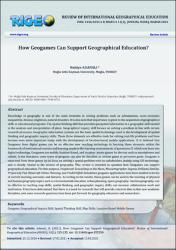How Geogames Can Support Geographical Education?
Citation
Adanalı, R. (2021). How Geogames Can Support Geographical Education? Review of International Geographical Education (RIGEO), 11(1), 215-235. doi: 10.33403rigeo.855550Abstract
Knowledge of geography is one of the main elements in solving problems such as urbanization, socio-economic inequalities, disease, migration, natural disasters. It is also seen that importance is given to the acquisition of geographical skills in educational programs. The spatial thinking skill that provides geospatial information is a geographic skill needed in the analysis and interpretation of place. Geographical inquiry skill focuses on solving a problem in line with certain research processes. Geographic information systems are the basic spatial technology used in the development of spatial thinking and geographic inquiry skills. These three elements are effective tools for solving real-life problems and have become even more important today with the development of location-based mobile applications. It is believed that Geogames from digital games can be an effective new teaching technology in learning these elements within the framework of motivational sources and learning needs in the learning environments of generation Z, which was born into digital technology. Geogames are mobile, location-based, and location- aware games for devices such as smartphones and tablets. In the literature, some types of geogame can also be classified as serious game or pervasive game. Geogame is separated from these games by its focus on solving a spatial problem with its stakeholders, mainly using GIS technology, and is closely related to the science of geography. This review is intended to question how Geogames can support geographical education. For this purpose, Youplaceit! Geocaching on the Moon, Neocartographer, Ingress, OriGami, SimCity, Project Lily Pad, Minecraft-Urban Planning, and FindeVielfalt Simulation geogame applications have been studied in terms of current learning outcomes and features. According to the results, these games can be used in the teaching of physical and human geography topics such as environmental education, urban planning, space geography, tourism geography; can be effective in teaching map skills, spatial thinking, and geographic inquiry skills; can increase collaborative work and motivation. It has been determined that there is a need for research that will provide concrete data in this new academic discipline, and some research questions have been put forward for geography educators and researchers.
Source
REVIEW OF INTERNATIONAL GEOGRAPHICAL EDUCATIONVolume
11Issue
1URI
https://dergipark.org.tr/tr/download/article-file/1493622https://hdl.handle.net/20.500.12809/9312


















